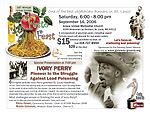Civil
rights activist Ivory Perry grabbed S.t Louis headlines in the
1960s for his daring acts of civil disobediance, such as lying
down in the street to stop traffic for the cause. He was shocked
to discover that lead poisoning was ruining childrens' health.
By starting a movement to eradicate this silent killer, he was
one of the first to call for environmental justice.
What
challenges remain in finishing the work of Ivory Perry? Join us
to discuss environmental activism, then and now!
• Percy Green,Community
Activist - Chair of ACTION Reunion 2006
• Maida Coleman, Missouri
State Senator - District 5
Sponsored by the Gateway Green
Alliance. For more information about the event, call 314-727-8554
or visit
www.gateway-greens.org
Additional
information:
Pesto Feasts of the Gateway Green Alliance have become well known
for the wide variety served, including: Great Green Walnut Pesto,
Sharp Lemon Pesto, Cinnamon Pesto, Vegan Pine Nut Pesto, No Nut
Pesto and Tomato Pesto. This year's event will start at 6:00 pm,
Saturday, September 16, 2006 at Grace United Methodist Church,
6199 Waterman (at Skinker).
At 7:00
pm there will be a special screening of the 30 minute movie, "Ivory
Perry: Pioneer in the Struggle Against Lead Poisoning." The
movie recently won a 2006 Telly Award as well as Best Documentary
in the St. Louis Filmmakers Showcase. It was produced Kriss Avery
and Jim Rothwell of Rainbow Sound.
Ivory
Perry was a civil rights activists who alerted St. Louis to the
dangers of lead poisoning. The segregation and racism that Ivory
experienced as a teenager in Arkansas meant that he was not surprised
to serve in a segre-gated unit when he joined the army in 1948.
Ivory
came to St. Louis in 1954 and was drawn into civil rights protests
within a few years. When the extensive picketing for jobs at Jefferson
Bank began in 1963, he was often in the press when arrested for
actions such as lying in front of cars.
Protests
of the 1960s objected to the exclusion of Blacks from American
life - from jobs, from voting, from be-ing served at lunch counters.
But when Ivory became an employee of the Human Development Corporation
in the late 1960s, he faced a different
aspect of racial injustice - Black people being crowded into substandard
housing.
While
visiting renters in their homes, Ivory noticed recurring health
problems among children. He discovered that it could be traced
to lead in the paint of old homes. His work was instrumental in
persuading the St. Louis Board of Aldermen to pass the city's
first legislation on lead in 1970.
Ivory
Perry had broken new ground in making the link between social
justice and human health issues. By the end of the decade, problems
such as these would become known as "environmental racism."
After
the movie, a discussion of environmental activism then and now
will be led by Percy Green (Chair of ACTION Reunion 2006) and
Maida Coleman (Missouri State Senator, District 5). Tickets to
the Pesto Feast are $20 at the door or $15 advance purchase (call
314-727-8554). Tomato sauce will abound for non-pesto eaters.
![]()


